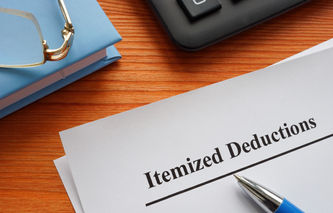Generally, a tax shelter is a program that allows individuals or businesses to permanently reduce or defer the payment of income taxes. These programs are not right for everyone; even legitimate ones involve a level of risk that not every investor will be comfortable undertaking.
Legal and Illegal Tax Shelters
In this article, we're going to discuss the concept of a tax shelter. This includes legitimate shelters, as well as those that are considered questionable, or even illegal. The Internal Revenue Service (IRS) takes a very close look at tax sheltering because it has traditionally been an area subject to abusive practices.
IRS Viewpoint
The IRS defines tax shelters as an investment that usually requires substantial contributions, often associated with a commensurate degree of risk. To individuals, a tax shelter usually means an investment that involves losses in the near-term, with the hopes of significant gains over the long-term.
For example, if someone were to invest in property located in a low-income neighborhood, the depreciation benefits of that property would be viewed as a legitimate tax shelter.
The tax deductions, or losses, an individual can take on a potential tax shelter is limited to the total amount invested, or at risk. For example, the amount considered "at risk" might be limited to:
The adjusted basis of the property
The cash invested
Loans taken that someone is personally responsible for paying back
Treatment of Losses
It is important to understand that business activity credits or losses are very likely considered passive activity credits or losses, which can only be used to offset income from other passive activities. They cannot be used to offset other income sources such as wages, interest, or dividends. Excess passive losses generated from a tax shelter may be carried forward, or until the investor disposes of the asset.
Be wary of tax shelters that are marketed with promises of write-offs larger than the amount invested. The IRS considers these Abusive Tax Shelters, and this topic will be discussed later on. Most of this is common sense; people invest with the hope of making money. A legitimate shelter involves some risk, reduces taxes fairly, and does produce income. If the IRS catches an individual in an abusive scheme, they will be paying the tax owed plus interest and penalties.
Legitimate Tax Shelters
The following are some of the more common legitimate tax shelters used by individuals as well as businesses. While any one of these can be twisted into an illegal form, these plans and programs are generally viewed as legal.
Retirement Plans
Perhaps the single most common tax shelter in the United States today has to do with individual retirement plans. Both individual retirement accounts and employee sponsored plans such as the 401(k) and 403(b) plans offer individuals the ability to defer payment of income taxes until their retirement years.
With the Roth IRA, Roth 401(k), and Roth 403(b), money is contributed on an after-tax basis, and the funds are not taxed when withdrawn in retirement. This is arguably one of the most attractive tax shelters of all time.
Limited Partnerships / Flow-Through Shares
There are certain heavy industries, such as mining or oil drilling operations, that spend significant capital money on exploration, and dedicate years of effort before generating any real income for investors.
To encourage investment in these types of industries, the U.S. tax code allows the cost of exploration to be distributed to shareholders in the form of a tax deduction. This mechanism allows investors an immediate income tax savings, as well as the ability to realize future gains from the exploration effort.
The IRS allows individuals to claim these exploration losses only as an offset to passive investment income, not all earned income.
Questionable Tax Shelters
Perhaps the two most common examples of illegal, or questionable, tax shelters today involve certain types of financing arrangements and offshore investments.
Financing Arrangements
This type of shelter involves a financing arrangement whereby one person pays an extremely high rate of interest on money invested. By doing so, the individual can reduce the income associated with the investment. When the investment is withdrawn, a large capital gain is realized. Tax sheltering occurs because capital gains are taxed at a lower rate than interest or dividend payments.
Offshore Investments
If an individual transfers funds to an offshore company, that transfer is considered a deductible expense, thereby lowering taxable income. Because of certain international agreements or treaties, income realized from these countries may not be taxable. In this example, the arrangement exists for the sole purpose of avoiding the payment of income taxes.
Identifying Illegal Tax Shelters
It's important to understand the attributes of a questionable program. Here are three simple rules of thumb that can be used to help separate legitimate from illegal tax shelters:
If the sole purpose of a particular transaction is to lower taxes, and not provide any other economic benefit to the parties involved, then the transaction should be considered questionable or unethical.
If a transaction involves the exchange of assets, goods, or services at prices that are below fair market value, this type of arrangement should be considered questionable.
Finally, if the rate of interest paid to another party is unusually low or high, and the intention of charging this unusually high or low interest rate is to shelter income from taxes, then this type of arrangement should be considered unethical.



